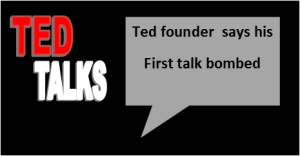TED Founder Says His First Talk Bombed
 If you’re like me, at least one TED talk has sent you scrambling for your phone to tell someone about it.
If you’re like me, at least one TED talk has sent you scrambling for your phone to tell someone about it.
The presentation was so captivating you just had to share it. And though the subject might be anything from sub sandwiches to subatomic particles, the truly memorable talks usually share one thing in common. The speaker has an effective delivery.
This is not to say they are always polished public speakers. Sometimes they are the opposite. But they all tell a clear and compelling story. They have the ring of authenticity in their voice. Most of all, they are honest.
I ran across an interesting post by Chris Anderson, one of the founders of TED, who says his first TED talk was a disaster.
Not a Natural Speaker
It happened in the early 2000s, when TED was struggling and Anderson was taking over as leader. He was invited to address a conference of TED stakeholders concerning TED’s future. Many were in favor of pulling the plug altogether.
As with all speakers, he had 15 minutes to make his case to keep TED going.
“Here’s what you need to know about me: I am not naturally a great speaker,” Anderson writes. “I say um and you know far too often. I will stop halfway through a sentence, trying to find the right word to continue. I can sound overly earnest, soft-spoken, conceptual. My quirky British sense of humor is not always shared by others.”
Anderson says he was so nervous when he took the stage he rolled a chair forward and sat down instead of standing.
“I spoke from the heart, with as much openness and conviction as I could summon. I told people I had just gone through a massive business failure. That I’d come to think of myself as a complete loser. That the only way I’d survived mentally was by immersing myself in the world of ideas. That TED had come to mean the world to me — that it was a unique place where ideas from every discipline could be shared. That I would do all in my power to preserve its best values. That, in any case, the conference had brought such intense inspiration and learning to us that we couldn’t possibly let it die … could we?”
What Makes a Great Talk?
Anderson’s talk was a smash. He took over the company and the rest is history. Today TED is an institution.
Why was Anderson’s address so effective, despite his shortcomings as a public speaker? Here’s what he says:
“There were many things wrong with that talk, but it succeeded in one key aspect. It was the idea that what was truly special about TED was not just the founder I was taking over from. TED’s uniqueness lay in being a place where people from every discipline could come together and understand each other. Its future was for all of us.
This idea changed the way the audience thought about the TED transition. It no longer mattered so much that the founder was leaving. What mattered now was that a special way of sharing knowledge should be preserved.”
Your job as a speaker is to take something that matters deeply to you and make your listener care about it too.
Doing this is not about acting ability, stage presence or smooth talking, as Anderson;s example illustrates. It’s about having something worth saying.
Source: LinkedIn Pulse https://www.linkedin.com/pulse/day-ted-might-have-died-chris-anderson?trk=eml-b2_content_ecosystem_digest-hero-14-null&midToken=AQGIfTg1JibXsQ&fromEmail=fromEmail&ut=3MBnK8UOGm0Dg1




